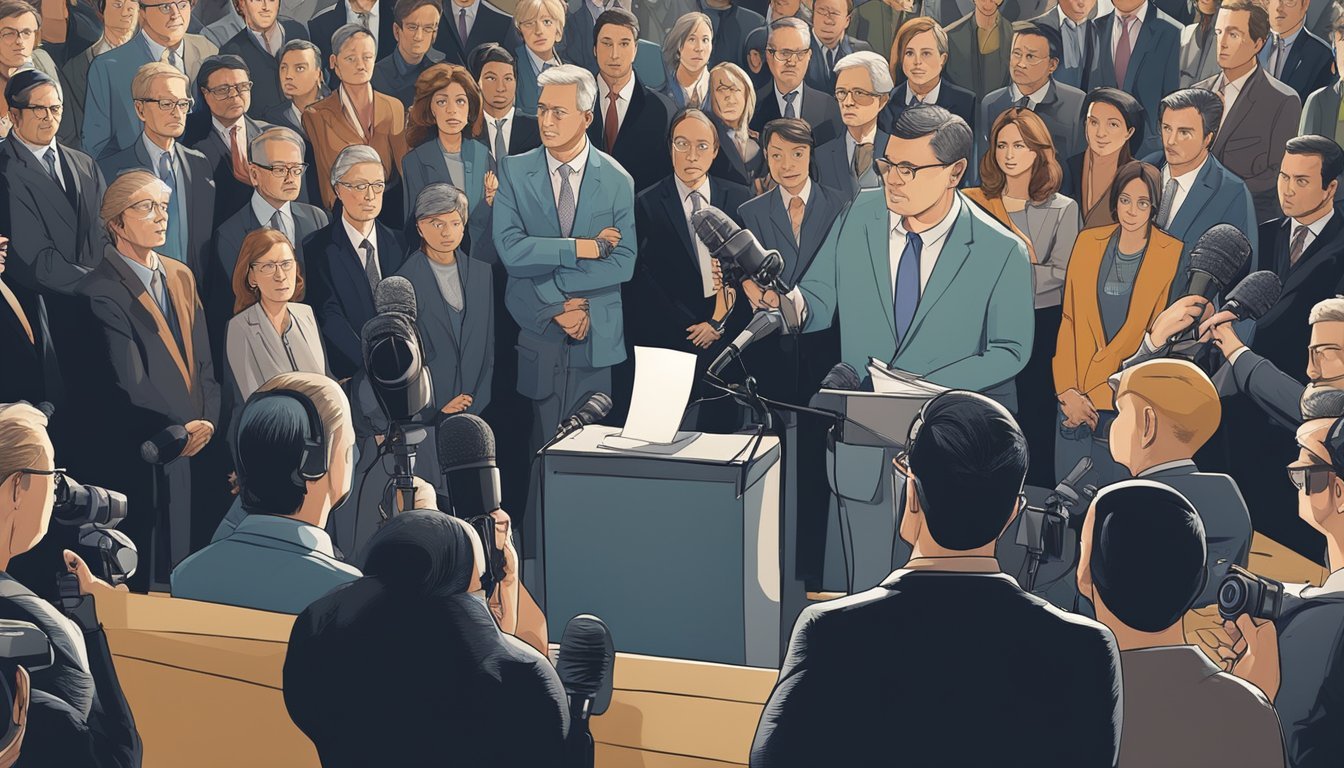Campaign Derailed: The True Scandal Behind 'The Front Runner'
Hart's Presidential Bid Unravels
Gary Hart's promising 1988 presidential campaign came crashing down in a scandal that changed American politics forever. The charismatic Colorado senator was the clear Democratic frontrunner until reports surfaced of an extramarital affair with model Donna Rice. The incident marked a turning point in political journalism, blurring the lines between public and private life for candidates.
The events surrounding Hart's downfall are dramatized in the film "The Front Runner," starring Hugh Jackman. It depicts how quickly Hart's campaign unraveled after the Miami Herald published a story about his relationship with Rice. Within days, the mounting pressure and media scrutiny forced Hart to withdraw from the race.
This scandal reshaped how the press covers political figures and campaigns. It ushered in a new era where personal conduct became fair game for reporters. The Hart affair set a precedent that continues to influence political coverage and vetting of candidates to this day.
The Rise and Fall of Gary Hart
Gary Hart's political journey saw him ascend rapidly to become a front-runner for the Democratic presidential nomination, only to have his ambitions shattered by scandal.
Political Beginnings and Ascent
Gary Hart entered politics as campaign manager for George McGovern's 1972 presidential run. This role launched his own political career. In 1974, Hart won election to the U.S. Senate representing Colorado.
He quickly gained a reputation as a reformer and innovative thinker. Hart's fresh ideas and charismatic persona attracted attention within the Democratic Party.
By his second Senate term, Hart had established himself as a rising star in national politics. He made his first bid for the Democratic presidential nomination in 1984.
The Pinnacle of a Promising Career
Hart emerged as the clear front-runner for the 1988 Democratic presidential nomination. His campaign focused on new ideas and generational change.
Polls showed Hart leading all potential Republican opponents. Many viewed him as the Democrats' best chance to reclaim the White House.
Hart's momentum seemed unstoppable. He led in fundraising and had a robust campaign organization across key states.
His intellect and policy expertise impressed voters and pundits alike. At 50, Hart represented a new generation of leadership for the Democratic Party.
The Infamous Scandal
Gary Hart's 1988 presidential campaign was rocked by a scandal that dramatically altered the landscape of political reporting. The controversy centered around allegations of an extramarital affair, which quickly spiraled into a media frenzy and public spectacle.
Exposure by the Media
The Miami Herald broke the story after receiving an anonymous tip about Hart's alleged infidelity. Reporters staked out Hart's Washington townhouse and observed a young woman, later identified as Donna Rice, entering and leaving the premises.
The newspaper published its findings, sparking intense scrutiny from other media outlets. The National Enquirer soon joined the fray, releasing photos of Rice sitting on Hart's lap aboard a yacht named "Monkey Business."
This aggressive reporting marked a shift in journalism, as politicians' personal lives became fair game for public consumption.
The Affair with Donna Rice
At the center of the scandal was Donna Rice, a 29-year-old model and actress. Hart had met Rice at a party in Miami, and their relationship quickly became the subject of intense speculation.
Hart initially denied any impropriety, challenging reporters to follow him around. This defiant stance backfired spectacularly when evidence of his encounters with Rice emerged.
The details of their relationship, including a weekend trip to Bimini, became fodder for tabloids and news programs alike.
Public Reaction and the Fallout
The public's response to the scandal was swift and severe. Many voters felt betrayed by Hart's perceived dishonesty and recklessness.
Hart held a press conference to address the allegations, but his explanations failed to quell the growing controversy. The intense media scrutiny and public disapproval forced Hart to suspend his campaign just days after the story broke.
The scandal sparked debates about privacy, morality, and the role of the press in vetting political candidates.
Impact on Hart's Campaign and Reputation
Hart's presidential ambitions were effectively ended by the scandal. He withdrew from the race on May 8, 1987, just five days after the Miami Herald's initial report.
The controversy left Hart with substantial campaign debt and a tarnished reputation. His political career never fully recovered from the fallout.
The scandal's lasting impact extended beyond Hart himself, fundamentally altering how the media covered politicians' personal lives and reshaping public expectations of political candidates' behavior.
Media's Role and Political Journalism
The Gary Hart scandal marked a pivotal shift in political journalism, altering how the media covered candidates' personal lives and reshaping campaign strategies. This transformation had far-reaching consequences for public figures and the political landscape.
The Shift in Political Reporting
The Miami Herald's investigation into Gary Hart's alleged affair signaled a new era in political journalism. Prior to this event, reporters often avoided scrutinizing candidates' private lives. The Hart scandal changed that, making personal conduct fair game for media coverage.
Journalists began digging deeper into politicians' backgrounds, seeking out potential scandals. This shift led to more aggressive reporting tactics and a blurring of lines between public and private spheres. The New York Times and other major outlets soon followed suit, adopting this new approach to political coverage.
The increased scrutiny forced candidates to be more cautious and guarded in their personal lives. It also raised questions about the public's right to know versus politicians' right to privacy.
Ethics of Investigative Journalism
The Hart scandal sparked debates about journalistic ethics and responsibility. Critics argued that focusing on personal lives distracted from important policy issues. Supporters claimed it was necessary to assess candidates' character and judgment.
Journalists grappled with how to balance thorough reporting with respect for privacy. They faced ethical dilemmas about when to pursue leads and how to verify sensitive information. The scandal also highlighted the power of the press to shape public opinion and influence political outcomes.
These ethical considerations became even more relevant in the digital age, as information spread rapidly online. The #MeToo movement further emphasized the importance of responsible reporting on allegations of misconduct.
The Influence of Media Consultants
The Hart scandal underscored the growing importance of media consultants in political campaigns. These professionals help candidates manage their public image and navigate media interactions.
Media consultants developed strategies to control narratives and minimize negative coverage. They coached politicians on how to handle tough questions and avoid potential pitfalls. Their role expanded to include crisis management and damage control.
Campaigns began investing more heavily in media training and public relations. This shift led to more carefully crafted public personas and tightly controlled press access. The relationship between politicians and the media became increasingly complex and adversarial.
The Cultural and Political Impact
Gary Hart's scandal reshaped American politics and media coverage of public figures. It sparked debates about privacy, sexual norms, and ethical standards for elected officials.
Changing Perceptions of Privacy and Public Figures
The Hart scandal marked a turning point in how the media approached politicians' private lives. Previously, journalists often ignored personal indiscretions. After Hart, scrutiny intensified.
Candidates faced heightened expectations of transparency. The public demanded more access to personal details. This shift blurred lines between public and private spheres for political figures.
Media outlets became more aggressive in pursuing stories about politicians' personal conduct. The scandal set a precedent for considering character and judgment as key factors in assessing candidates.
Womanizing and Sexual Taboos in Politics
Hart's affair brought extramarital relationships into the political spotlight. It challenged the unspoken acceptance of male politicians' infidelities.
The scandal sparked discussions about sexual double standards. Women in politics faced different expectations regarding their personal lives compared to men.
Adultery became a more significant liability for candidates. Voters increasingly viewed extramarital affairs as reflections of poor judgment and untrustworthiness.
Political campaigns had to address sexual behavior more directly. Candidates faced pressure to present themselves as faithful spouses and moral exemplars.
Political Behavior Post-Scandal
Hart's downfall prompted changes in how politicians managed their public image. Campaigns became more cautious about candidates' personal lives and past behavior.
Opposition research expanded to include thorough examinations of personal history. Vetting processes for potential candidates grew more rigorous.
Politicians adopted stricter personal conduct standards to avoid scandal. Some chose to preemptively disclose past indiscretions to control the narrative.
The incident influenced subsequent elections, including U.S. midterms and presidential races. Voters placed greater emphasis on candidates' personal character and perceived moral integrity.
Responses and Reactions
The Gary Hart scandal elicited diverse reactions from various political actors and institutions. These responses shaped the subsequent narrative and had lasting impacts on American politics.
The Stance of the Democratic Party
The Democratic Party faced a crisis following Hart's withdrawal. Party leaders scrambled to find a new frontrunner, with many turning to Massachusetts Governor Michael Dukakis. Some Democrats criticized the media's role in Hart's downfall, arguing it set a dangerous precedent for political journalism.
Party strategists debated how to address character issues in future campaigns. Many advocated for more thorough vetting of candidates' personal lives. The scandal also prompted discussions about reforming the primary process to better withstand unexpected shocks.
Gary Hart's Memoir and Later Insights
In his 1993 memoir "The Good Fight," Hart reflected on the scandal that ended his presidential bid. He expressed regret for his actions but also criticized what he saw as sensationalist media coverage.
Hart later argued that the scandal marked a turning point in American politics, ushering in an era of heightened scrutiny of candidates' personal lives. He maintained that this shift ultimately harmed the quality of public discourse and deterred qualified individuals from seeking office.
In subsequent years, Hart occasionally commented on the evolving nature of political scandals and media coverage.
Opponents' Views and Strategies
Republican strategists, including Lee Atwater, seized on Hart's downfall to paint Democrats as morally compromised. The Bush campaign carefully avoided direct comments on the scandal while benefiting from the disarray in the Democratic field.
Some Democratic rivals, like Joe Biden, publicly expressed sympathy for Hart while privately recalibrating their campaign strategies. Political consultants like Raymond Strother analyzed the scandal's impact on campaign tactics, noting a shift towards more aggressive opposition research.
The Hart scandal influenced how future campaigns approached personal issues, with increased emphasis on preemptive disclosure and crisis management.
The Front Runner: Depiction in Media and Culture
"The Front Runner" brought Gary Hart's 1988 presidential campaign scandal to mainstream audiences. The story sparked discussions about politics, media ethics, and personal privacy in the public sphere.
Hugh Jackman's Portrayal in Cinema
Hugh Jackman took on the role of Gary Hart in the 2018 film "The Front Runner." Directed by Jason Reitman, the movie focused on the three weeks of Hart's campaign that led to its collapse. Jackman's performance aimed to capture Hart's charisma and the complexities of his character during this tumultuous period.
The film received mixed reviews from critics. Some praised Jackman's nuanced portrayal, while others felt the movie struggled to fully explore the implications of the scandal. Reitman's direction attempted to balance the personal drama with the broader political context of the era.
The Book and the True Story Adaptation
"The Front Runner" was based on Matt Bai's 2014 book "All the Truth Is Out: The Week Politics Went Tabloid." The adaptation aimed to stay true to the events while dramatizing them for the screen. Bai served as a co-writer for the screenplay, lending his journalistic insight to the project.
The film and book both explored how Hart's scandal marked a turning point in political reporting. They highlighted the shift towards more invasive coverage of politicians' personal lives. Some critics argued that the adaptation simplified complex issues for dramatic effect.
The Legacy in Popular Culture
Gary Hart's story has become a cautionary tale in American politics. "The Front Runner" reignited interest in the scandal and its lasting impact on political journalism. The film sparked debates about the media's role in vetting candidates and the public's right to know about politicians' private lives.
References to Hart's downfall continue to appear in political commentary and popular culture. The story is often cited when discussing political scandals or changes in media coverage of campaigns. "The Front Runner" played a significant role in bringing this historical moment to a new generation of viewers.
The Aftermath and the Future of Political Campaigns
Gary Hart's scandal reshaped political campaigns and media coverage. It set new precedents for scrutiny of candidates' personal lives and altered campaign strategies.
Lesson Learned and Changes Adopted
Campaigns became more guarded about candidates' personal lives. Staff implemented stricter protocols to prevent scandals. Candidates faced increased vetting of their backgrounds.
Media outlets adopted more aggressive reporting tactics. They devoted more resources to investigating politicians' personal conduct.
Campaigns developed rapid response teams to address controversies quickly. Crisis management became a crucial skill for political operatives.
The Influence on Future Presidential Races
Presidential candidates faced heightened scrutiny of their personal lives. Many chose to address potential controversies proactively.
Some politicians, like Barack Obama, released extensive personal information early in their campaigns. This strategy aimed to preempt damaging revelations.
Campaigns invested more in opposition research. They sought to uncover and prepare for potential scandals before opponents could exploit them.
Media Tactics and Political Strategy Evolutions
Campaigns became more controlling of candidate access. Scripted events and limited press interactions became common.
Social media emerged as a tool for candidates to communicate directly with voters. This allowed them to bypass traditional media filters.
Opposition research expanded beyond policy positions to personal conduct. Campaigns hired specialized firms to dig into opponents' backgrounds.
Media outlets faced ethical debates about reporting on politicians' private lives. Some adopted stricter standards for publishing personal information.





